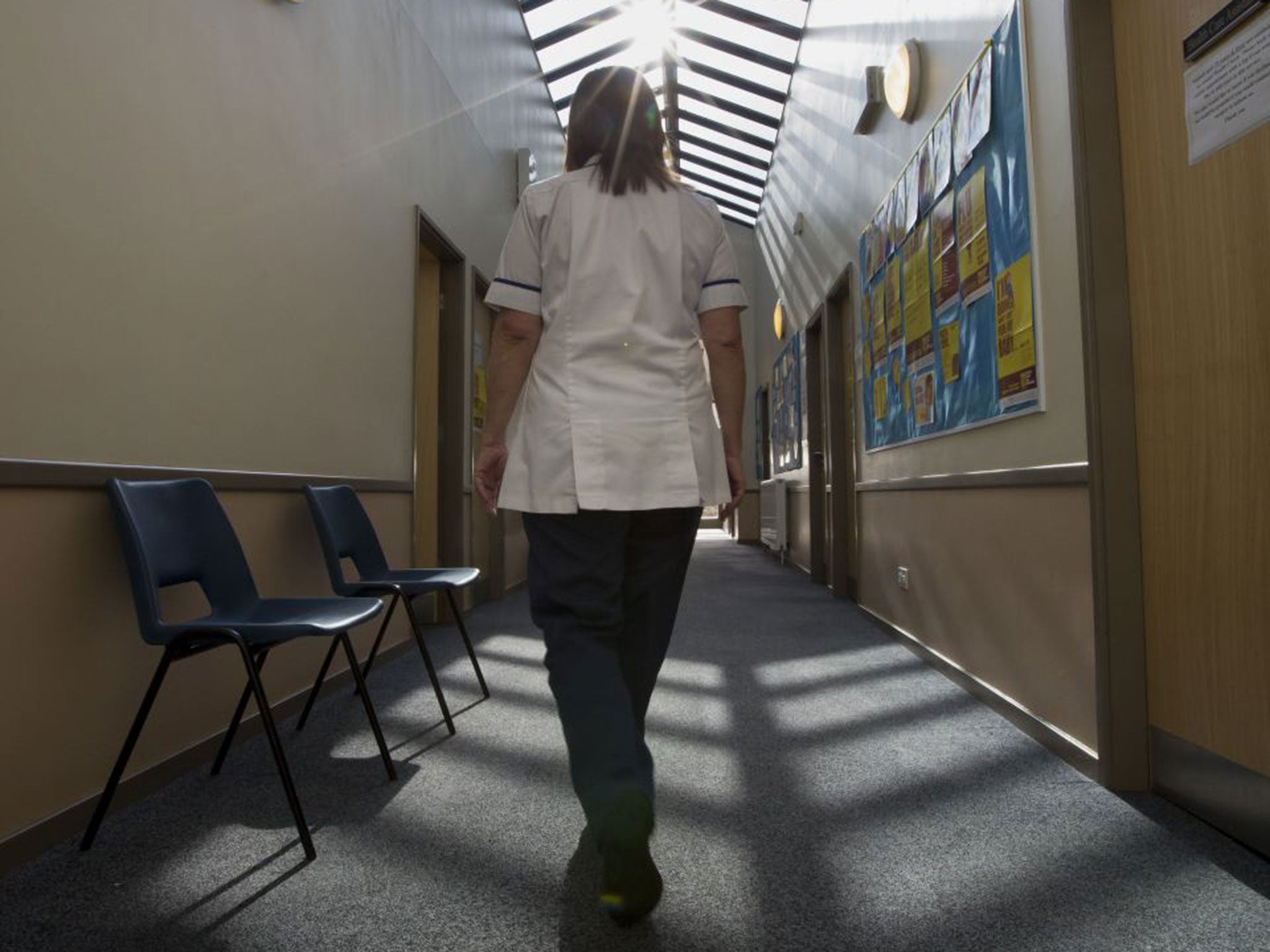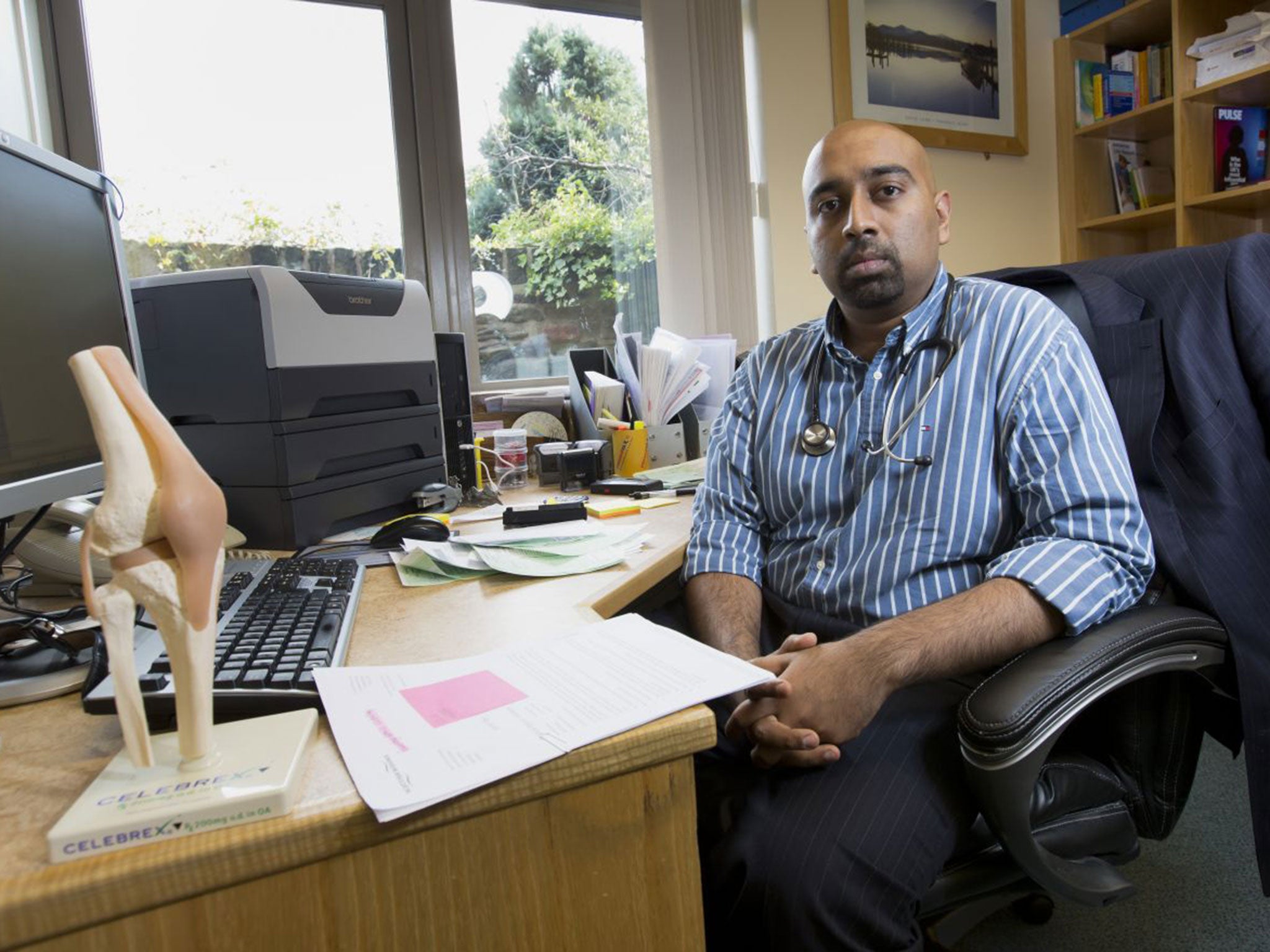GP practices in peril: Doctors leave, trainees are given wrong incentives and little time for patients
A financial injection to local surgeries has been promised by politicians, but confidence within the service is at a low ebb

Dr Krishna Kasaraneni has an old memo pinned above the desk in his consulting room.
On it are the names of the five GPs who worked at the Crown Street Surgery, in Swinton, South Yorkshire, when he became a GP here only two years ago.
Today, he’s the only one of the original doctors left.
Among those who have moved on is the man who trained him to be a GP and two colleagues who uprooted their family and left to work in Canada.
“Two GPs with maybe 25, 30 years to give the NHS who were both working full-time, said: ‘No, enough’,” he says ruefully. “Sarah was a local lass, born and bred in Swinton, For her to pack up and leave a town where her whole family live and move thousands of miles away because all she wanted was to be a GP – that just about sums up the feeling at the moment.”
This is because, he says, ‘being a GP’ in England today is not what it used to be.
Crown Street, which has been able to replace only three of the four departed full-time doctors, serves a population of around 9,000 patients.
On Monday last week, three per cent of that population visited or called the surgery: 280 consultations on a single day. That is not atypical.
From the first appointment at 7am, to the last one at 6.20pm, it’s not uncommon for one GP at this practice to see more than 60 patients in a day. Some of those patients had to wait two, in some cases nearly three weeks for a routine appointment.
On the day The Independent visited Crown Street, David Cameron – faced with a growing crisis in GP access – announced that he wanted all GP surgeries to open seven-days a week, from 8am till 8pm, and earmarked £100m per year over the next Parliament to achieve it.
Dr Kasaraneni is unconvinced.
“£100m per year is less than £2 per patient. We have 9,000 patients. So we get £18,000 to open for another 100 days a year?
“General practice is already under a lot of stress and I’m not sure there is room to do more without dealing with the current issues. The rot has to stop before promising anything else.”
The “rot” he refers to is a triple crisis for England’s GPs: workforce, workload and funding. Despite the fact that 90 per cent of the interactions patients have with the NHS take place in a GP practice, the GP sector receive only 8 per cent of NHS cash: an historic low.

With that cash – around £9.3bn – England’s GPs see 370 million patients a year – 60 million more than five years ago.
In that time, the number of GPs has remained stagnant at around 32,000.
Many GP training places are not being filled because of a perception that the job is unglamorous and, increasingly, a lot of hard work – the reward for which is blame, from politicians and the media, for all the ills of the NHS.
Older GPs are retiring in droves or, like Dr Kasaraneni’s colleagues, swapping the NHS for better working hours and more time with patients in Canada, Australia and New Zealand.
The inevitable result back home, is that our supply of GPs is being outstripped by demand for GP time. Patients are well aware of the consequences.
In the waiting room of the Crown Street Surgery, Claire Rowley, a mother of two, has arrived with her new-born baby daughter, who has an eye infection.
She rang the surgery first thing in the morning and was able to get a same-day appointment. It’s a guarantee that the Crown Street and many other GP surgeries offer patients with more urgent problems – a fact which is often lost in the debate about GP access.
But last time she needed a routine appointment, she had to join the waiting list. “It took two to three weeks. I have lived in Swinton for 10 years and in that time it has become harder to get an appointment,” she said. “It’s not really acceptable to have to wait that long.”
Different GP practices have different problems, but most of them come back to cash.
In inner city areas, dozens of practices have been threatened with closure this year because of changes to the GP funding formula, which critics say have discriminated against practices serving poorer patients.
Virginia Patania, manager of the Jubilee Street Practice in east London, has been at the forefront of a campaign to rescue inner-city practices running out of cash.
“We open up at 7.30am or 8am, we close at maybe 8.30pm – 9pm,” she says. “An average GP day is 13 to 14 hours. We have an average of 58 to 62 patient contacts per GP, per day. When you’re seeing that many patients, if you’re an average GP earning £90,000 a year – which ours don’t – your cost, after tax and pension, is £1.80 to £2.00 per patient seen. There isn’t a national health service or private health service in the world where a GP consultation costs £1.80.”
Her calculation is based on the ‘new normal’ for GPs: 10-minute long appointments: a timeframe which is manageable if a patient has just one problem to discuss. However, the bulk of a GP’s workload in the 21st century is patients, often elderly, with a number of conditions.
These kinds of patients now represent 70 per cent of NHS spending, according to one of the few politicians who can claim to genuinely sympathise with GPs.
Dr Sarah Wollaston MP, who worked as a family doctor before entering Parliament, is now chair of the influential Health Select Committee. She feels the changing nature of NHS patients demands a change in the NHS workforce. “We need to have more generalists,” she said. “As students go through medical school they must spend more time training in general practice. Some medical schools are very good at training generalism. Others still retain a very old model where students have the tiniest percentage of their medical school career in general practice.”
Medical students should be encouraged to think of general practice as a more viable career option in today’s NHS than a speciality like cardiology or ophthalmology, which Dr Wollaston said were oversubscribed.
Currently, many medical graduates were spending years in expensive specialism training schemes, only to find there are no consultant posts available, she said. However, the higher salaries they accrue through their qualifications follow them into their next training scheme, often general practice, placing a great burden on surgery budgets. “At the moment there’s no disincentive for doctors to choose unrealistic career paths,” Dr Wollaston said.
GPs are central to plans for a major reform of the way the NHS works – which will focus on prevention and care in the community and in the home, to ensure fewer patients with long-term conditions end up in hospital.
To achieve this more GPs will be needed, and it is likely that more practices will have to become “federations”, pooling resources and sharing patient demand. Across the political spectrum, and among NHS officials, there is now a consensus that more GPs will be needed. Labour have promised 8,000, the Conservatives 5,000. To achieve the desired results – shorter waiting times, longer appointments and fewer patients ending up in hospital, the Royal College of General Practitioners estimates that GP funding will have to increase from 8 per cent to 11 per cent of the NHS budget. With an NHS-wide deficit looming, it is hard to see how that will be possible.
“We need to make sure that once we train them, we don’t lose them,” said Dr Kasaraneni. “We are haemorrhaging GPs and unless you stop that, it doesn’t matter how many you train.
“General practice is at a breaking point, we are struggling. That doesn’t mean this is the maximum we can do,” he said. “We can do a hell of a lot more but only if there is the will to deliver us the right tools and the finances to do it.”
Join our commenting forum
Join thought-provoking conversations, follow other Independent readers and see their replies
Comments